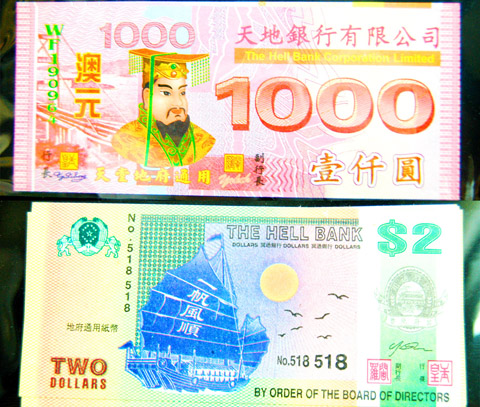Ghost money, traditionally burned as an offering to ancestors or the spiritual world, may soon be governed by a “central bank,”as one manufacturer has registered and obtained copyrights for the “Bank of Heaven” and the “Bank of Hell” to prohibit competitors from printing the widely used terms.
The two terms have been used by almost all paper money manufacturers in the country for as long as many of them can remember.
Lai Ting-yuan (賴丁源) recently sent out legal warnings to ghost money sales outlets demanding that they stop selling ghost money bearing the names of the two “banks” that were not printed at his factory. The letter told the stores to cease within seven days or face copyright violation lawsuits.

PHOTO: WANG SHU-HUNG, TAIPEI TIMES
Lai’s competitors have said that using the two “bank” names has long been a practice in the industry.
In Lai’s letter, he said that he had registered the “banks” with the Ministry of the Interior as early as 1996, spending a lot of money to advertise the brand. But in 2006, one of Lai’s competitors, Chang Yung-song (張永松), applied with the Ministry of Economic Affairs for the copyright of the two “banks,” which Lai said severely impacted his sales.
Lai said he filed an appeal with the Intellectual Property Office against Chang’s claim, and that on June 16 the office said Chang’s copyrights had been revoked.
Lai said he then obtained the copyrights on Aug. 1.
In his letters, Lai said that copyright infringement called for prosecution and urged competitors to stop violating his rights.
However, other manufacturers cited examples of the name being used as early as 1963, saying the copyright was unfair.
In light of other ghost money sales outlets’ complaints, the Intellectual Property Office said it would conduct an investigation for the origin of the names, adding that if the office finds that the banks indeed existed before Lai, his copyright ownership would be withdrawn.

Aftershocks from a magnitude 6.2 earthquake that struck off Yilan County at 3:45pm yesterday could reach a magnitude of 5 to 5.5, the Central Weather Administration (CWA) said. Seismological Center technical officer Chiu Chun-ta (邱俊達) told a news conference that the epicenter of the temblor was more than 100km from Taiwan. Although predicted to measure between magnitude 5 and 5.5, the aftershocks would reach an intensity of 1 on Taiwan’s 7-tier scale, which gauges the actual effect of an earthquake, he said. The earthquake lasted longer in Taipei because the city is in a basin, he said. The quake’s epicenter was about 128.9km east-southeast

The Taipei Summer Festival is to begin tomorrow at Dadaocheng Wharf (大稻埕), featuring four themed firework shows and five live music performances throughout the month, the Taipei Department of Information and Tourism said today. The festival in the city’s Datong District (大同) is to run until Aug. 30, holding firework displays on Wednesdays and the final Saturday of the event. The first show is scheduled for tomorrow, followed by Aug. 13, 20 and 30. To celebrate the 30th anniversary of Disney Pixar's movie Toy Story, the festival has partnered with Walt Disney Co (Taiwan) to host a special themed area on

BE CAREFUL: The virus rarely causes severe illness or death, but newborns, older people and those with medical conditions are at risk of more severe illness As more than 7,000 cases of chikungunya fever have been reported in China’s Guangdong Province this year, including 2,892 new cases last week, the Centers for Disease Control (CDC) yesterday said it is monitoring the situation and considering raising the travel notice level, which might be announced today. The CDC issued a level 1 travel notice, or “watch,” for Guangdong Province on July 22, citing an outbreak in Foshan, a manufacturing hub in the south of the province, that was reported early last month. Between July 27 and Saturday, the province reported 2,892 new cases of chikungunya, reaching a total of 7,716

The New Taipei City Government today warned about the often-overlooked dangers of playing in water, and recommended safe swimming destinations to cool off from the summer heat. The following locations in the city as safe and fun for those looking to enjoy the water: Chienshuiwan (淺水灣), Baishawan (白沙灣), Jhongjiao Bay (中角灣), Fulong Beach Resort (福隆海水浴場) and Sansia District’s (三峽) Dabao River (大豹溪), New Taipei City Tourism and Travel Department Director-General Yang Tsung-min (楊宗珉) said. Outdoor bodies of water have variables outside of human control, such as changing currents, differing elevations and environmental hazards, all of which can lead to accidents, Yang said. Sudden